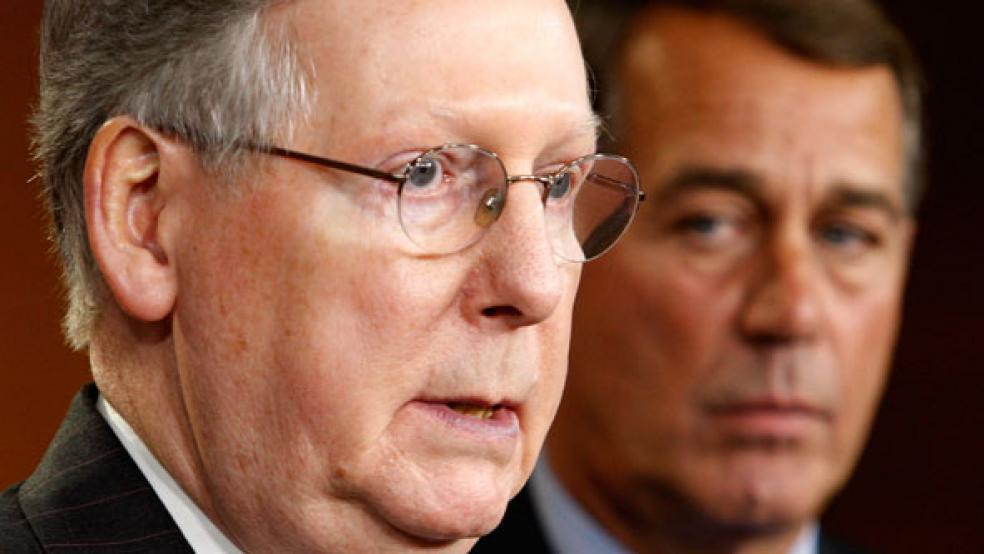As the Obama administration and Congress head into their annual budget battle this fall, conservatives have begun marshaling their arguments in favor of a renewed GOP hard line on spending and entitlement programs.
Many conservative lawmakers and policy gurus would preserve the automatic $76 billion in spending cuts under the sequester for the next fiscal year.
But the real battle is shaping up over mandatory programs such as Social Security, Medicare and other entitlements. These currently account for 45 percent of the $3.5 trillion annual federal budget, a share that will only grow as more and more baby boomers reach retirement.
RELATED: GOP's 2016 DIVIDE: PRAGMATISTS VS. IDEOLOGUES 
House Majority Leader Eric Cantor (R-VA) laid out his terms earlier this month on Fox News Sunday. “What we need to have happen is leadership on the part of this president and the White House to come to the table finally and say we’re going to fix the underlying problem driving our deficit," Cantor said. “We know that is the entitlement programs and the unfunded liability that they are leaving on this generation and the next.”
In a preview of what President Obama and Senate Democrats are up against, the conservative Heritage Foundation issued a “by-the-numbers” report on Tuesday to bolster the Republican argument. The White House will not only have to parry the argument that it should be concerned about the budget a decade from now – it will have to find some alternative to appease many GOP lawmakers who are determined to slash projected spending further.
“Without any changes, mandatory spending, including net interest, will consume three-fourths of the budget in just one decade,” states the Heritage study. And with Obamacare revving up this fall, overall federal health care spending will reach $1.8 trillion by 2023 – eclipsing the $1.4 trillion that will go toward Social Security that year as the largest budget item, the report said.
Obama has signaled a willingness to consider some changes in entitlement spending, such as adopting a less generous cost of living adjustment in return for additional tax revenue and increased spending on the middle class. But many liberal Democrats and seniors groups adamantly oppose any tampering with Social Security and Medicare, especially given an improving deficit picture.
RELATED: OMB DIRECTOR: WHO SAYS WE CAN'T FIX THE BUDGET?
What’s more, Obama and congressional Democratic leaders have vowed to fight to end the sequester mandated by the 2011 Budget Control Act, arguing that the first installment of those cuts this year have undermined military readiness and harmed the economy.
The Washington Post reported yesterday that unemployment rates rose in the District of Columbia, Maryland and Virginia in July, a sign that federal spending cuts may be starting to weigh on the region’s labor market.
‘MAKES ME FRUSTRATED’
Earlier this month at Camp Pendleton, Calif., Obama blamed Republican obstinacy for blocking efforts to block or blunt the impact of the automatic cuts. “What makes me frustrated is sometimes the very folks who say they stand with our military proudly are the same ones who are standing in the way of fixing the sequester,” he said, stopping short of naming the GOP outright.
Sen. Ted Cruz (R-TX), a Tea Party champion and possible aspirant for the 2016 Republican presidential nomination, has proposed along with several other lawmakers forcing a government shutdown to block implementation of Obama’s Affordable Care Act – a move that many Republicans are wary of doing because of the likely negative public backlash.
But House Republican leaders have embraced a different strategy. They’ve refused to negotiate a compromise budget for the fiscal year beginning Oct. 1, and instead are unilaterally pressing to impose deep cuts in spending for the coming year.
House Speaker John Boehner (R-OH) continues to insist that any increase in the federal debt ceiling this fall must be matched by an equivalent reduction in long-term expenditures – a way to force major concessions from the administration.
The debt ceiling now stands at $16.699 trillion. The Treasury Department said recently that it can continue to pay the country’s bills without breaching the legal limit on borrowing until sometime after Labor Day.
Obama and his budget chief, Sylvia Mathews Burwell, have warned repeatedly that the administration refused to negotiate the terms of the debt ceiling again, while Rep. Chris Van Hollen of Maryland, the ranking Democrat on the House Budget Committee, dismissed Boehner’s demands this week as “unworkable, policy-wise and politically.”
The government is projected to complete the fiscal year Sept. 30 with a deficit of only $642 billion – a far cry from the trillion-dollar deficits of recent years. But the national debt nonetheless will reach a record of nearly $17 trillion by year end, which is more than 100 percent of GDP and a cause of concern for many budget experts on both sides of the aisle.
“The nation should not take this short-term and modest deficit improvement as a signal to grow complacent about reining in exploding spending,” the Heritage report said. “Though deficits will decline for a few more years, existing spending cuts and tax increases will not prevent them from rising soon and within a decade exceeding $1 trillion once again.”





